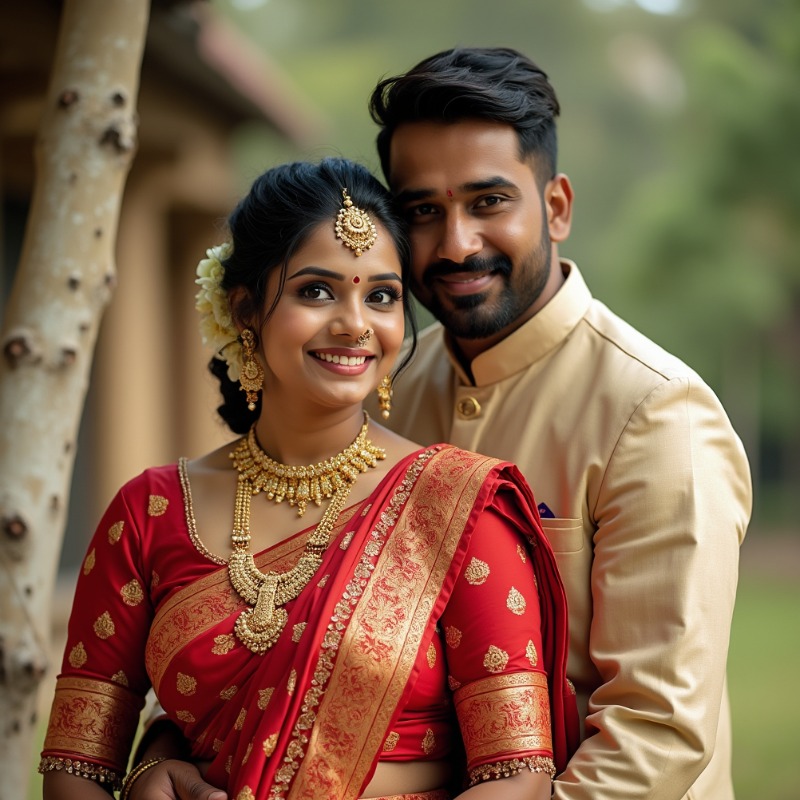Smiling faces, the rhythmic beats of the mridangam, and a sea of colorful guests bore witness to the grand wedding of Avani and Bitopan. She, a dusky Kerala beauty with eyes like monsoon clouds; he, from the lush hills and crimson rivers of Assam. Their union was a vibrant fusion of the South and Northeast—cultures clashing, families sparring, yet hearts in sync.
Everything happened at whirlwind speed. What began as a cut-throat confrontation between families—armed with ancestral pride, language barriers, and stubborn traditions—melted into reluctant acceptance. After all, as they say, true love conquers all. Except, sometimes, the biggest battles lie not outside, but within.
The first year of marriage passed like a soft breeze—sweetened by forgiveness, strengthened by vows to pardon each other's quirks and flaws. But by year two, those flaws weren’t so romantic anymore. Tiny “error corrections,” as they called them, were requested—politely at first, then more pointedly, each insisting the other needed fixing.
Now settled in the UAE, their biggest challenge wasn’t cultural but linguistic. Surrounded by Avani’s extended Malayalee network, Bitopan found himself the minority in more ways than one. Gulf life came with its quirks, but nothing amused—or annoyed—him more than the omnipresence of Mallus. And when their social gatherings turned into Malayalee Pride Parades, with jokes flying in Malayalam and entire conversations happening over his head, Bitopan couldn’t help himself. He rolled his eyes, cracked a sarcastic comment or two, and that was all it took.
His bottled-up fury often found unexpected release in social circles, especially when he spotted fellow Hindi speakers at a gathering. It was as if finding linguistic allies gave him permission to air his grievances, particularly about Avani’s roots. His voice, tinged with sarcasm, would come alive in these moments: mocking the everyday fish curry and rice, branding it with disdain masked as wit. And once, when Avani happened to decline a North Indian favourite like shrikhand, he murmured—just loud enough for her to hear—“Of course she won’t. She only eats...
Laughter would ripple around the room. Avani laughed too, trained by years of social diplomacy—but inside, something cracked. Each joke felt like a pinprick to her identity, each laugh a reminder that she was a guest in a world that should have been hers.
The ride home would be quiet, heavy, until it boiled over.
“You should have thought about it before making me feel like an outsider,” she’d snap, her voice trembling with pride and pain. “That’s my food. That’s my culture. Have I ever insulted you in front of anyone?”
Bitopan would fall silent. But Avani wasn’t done.
“I don’t deserve this treatment. I’m not a housewife living off your money. I’m a working woman—strong, independent, and proud of my origins.”
Avani, once easygoing, now stood like a warrior queen, defending her language, her people, her identity. The parties would end, but the aftershocks hit the next day.
“Can you order some tomatoes and milk?” she’d ask casually.
“Why don’t you order? He understands you better,” he’d reply with a smirk.
And boom—another war.
“Oh, please! Do you think only Malayalees shop at Lulu? You think no one else exists?”
These were no longer petty fights. They were proxy wars—fought through groceries, sarcasm, and selectively silent dinners. Promises of sticking together in “thick and thin” hadn’t accounted for this thin-this frustrating, hairline-thin layer of unmet expectations.
They drifted in cycles—cold silences, distant gazes, one on the couch, the other in bed. And then, just as the frost was settling, a birthday party or wedding invite would thaw it out. Smiles would reappear, apologies—some sincere, some cosmetic—would be exchanged.
But Avani, despite forgiving, rarely forgot. For Bitopan, things evaporated faster, like spilt chai on a summer day. For her, they sank, settled, and stayed.
Then came Valentine's Day—the third one since marriage. The first two were filled with gifts, sweet surprises, and the thrill of doing something new.
But this year, Avani began hinting as early as December. She wanted a little magic—a gesture, a moment, something like what her aunt and uncle had shared during their 25th anniversary. A spark. Just one.
The day arrived. Avani was dressed in red, her favourite candles lit, and soft music played. She waited, smiling at every sound outside, her heart fluttering with anticipation.
The doorbell rang.
She opened it, radiant, only to be met with confusion.
"Why is the house so dark? Is the power out? Who’s coming over? Why are you dressed like this?”
Her heart dropped.
The flames on the candles weren’t the only ones extinguished that night. Rage welled up in her like a monsoon cloud about to burst. Without a word, she blew out the candles, tossed herself onto the sofa, and let the tears come—each drop a punctuation mark in the sentence: What was I thinking? Nobody is to be blamed for my selection.
But time passed, and like so many things in marriage, it was folded away in the linen closet of memory—until another gathering with his friends, or the next Valentine's Day or any other Day...



 React
React
 React
React
 React
React
 React
React
 React
React